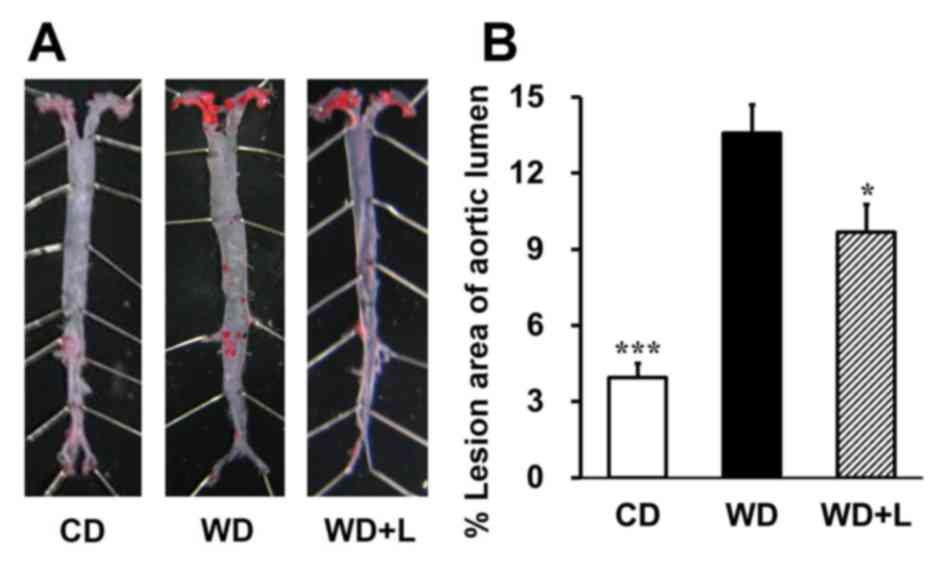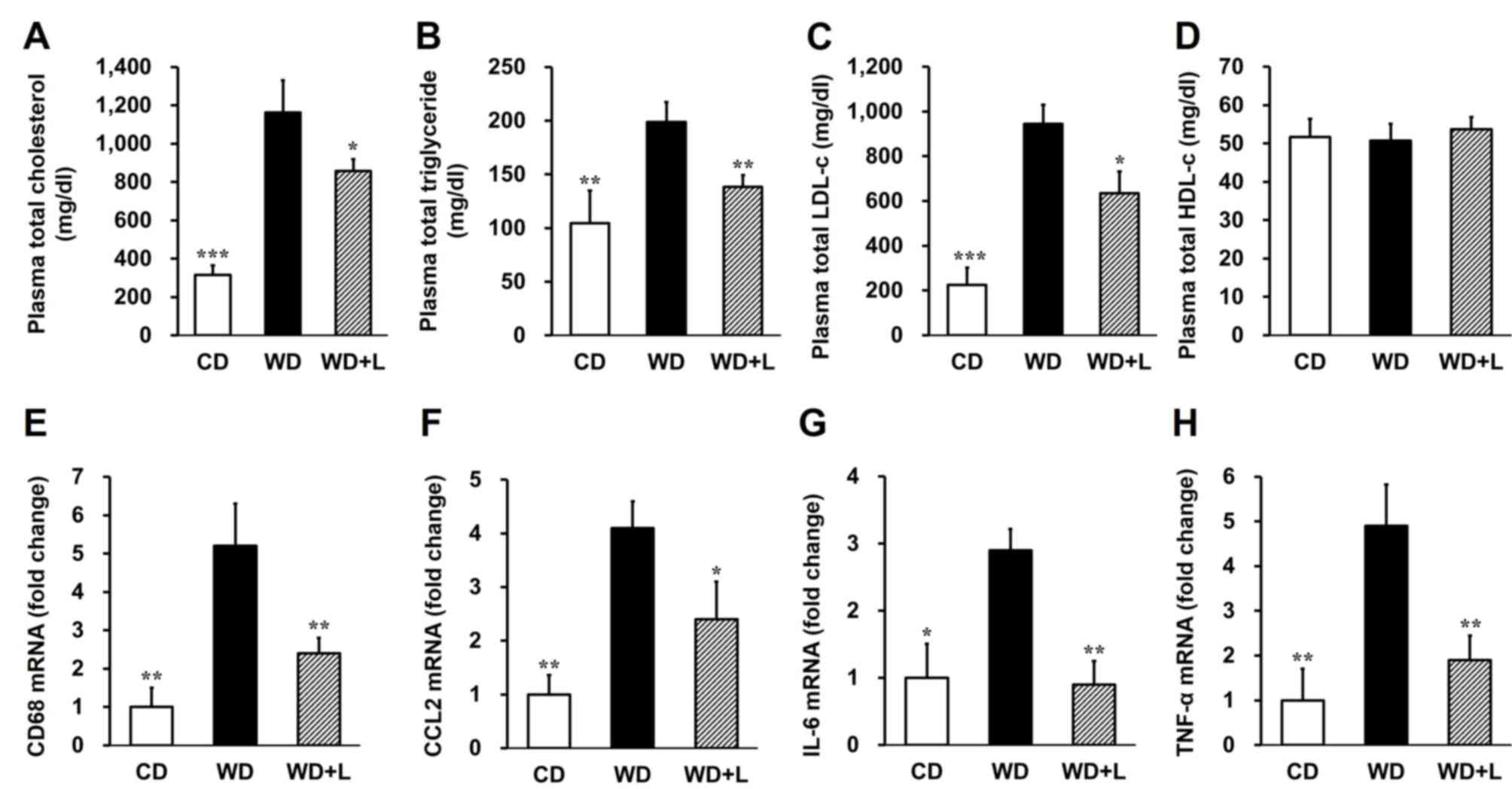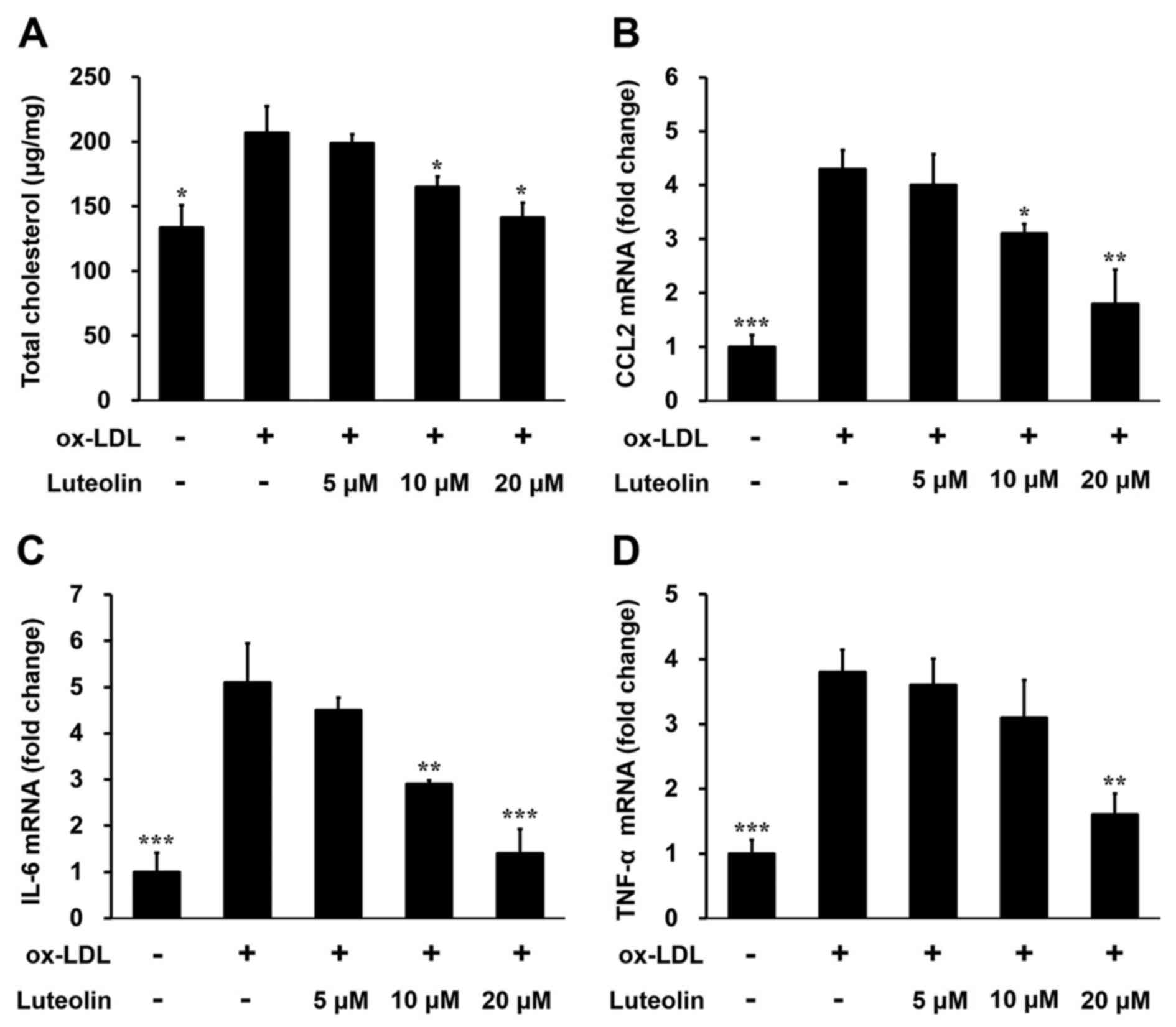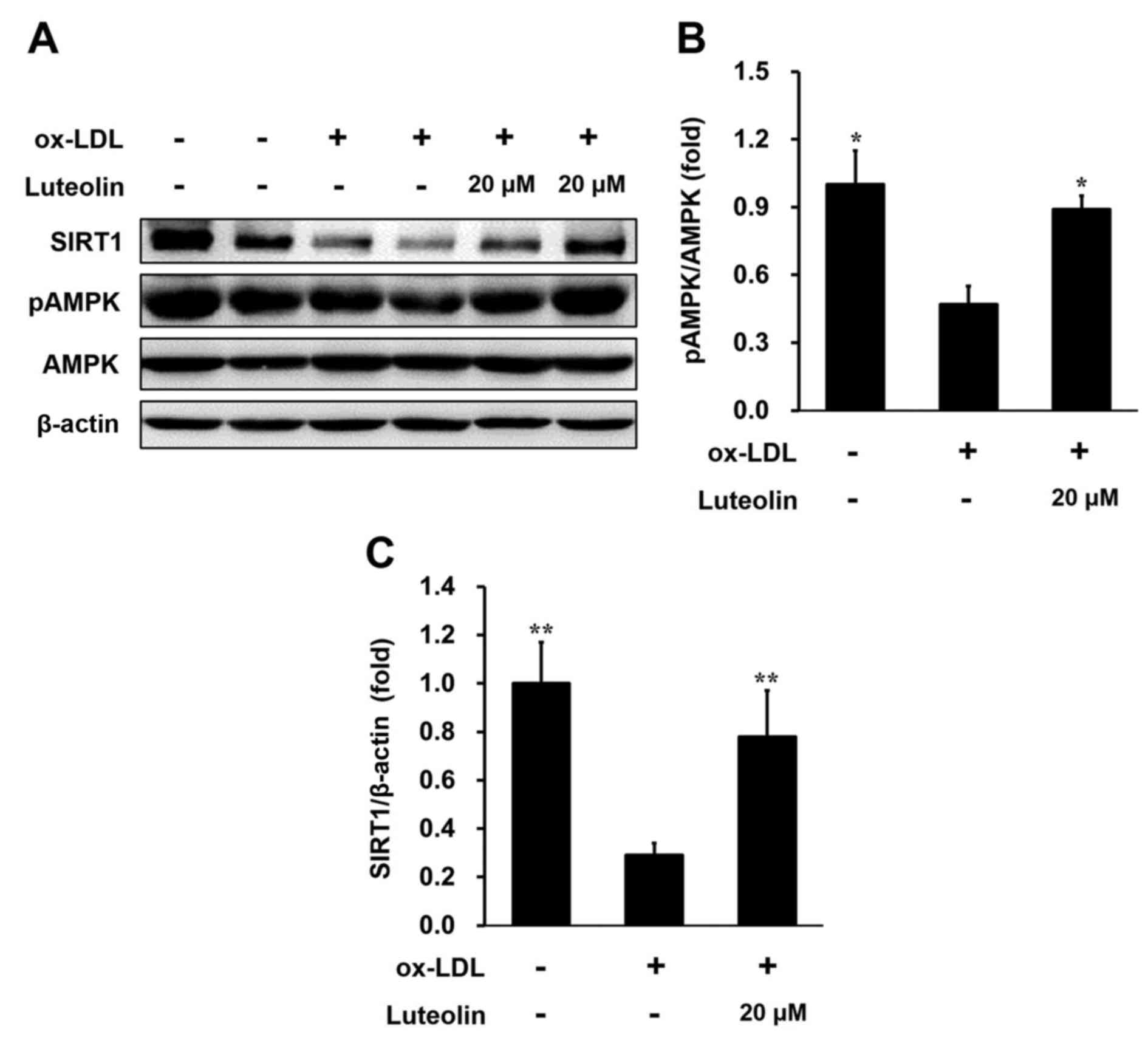|
1
|
Glass CK and Witztum JL: Atherosclerosis.
The road ahead. Cell. 104:503–516. 2001. View Article : Google Scholar : PubMed/NCBI
|
|
2
|
Celermajer DS, Chow CK, Marijon E, Anstey
NM and Woo KS: Cardiovascular disease in the developing world:
Prevalences, patterns, and the potential of early disease
detection. J Am Coll Cardiol. 60:1207–1216. 2012. View Article : Google Scholar : PubMed/NCBI
|
|
3
|
Ross R: Atherosclerosis-an inflammatory
disease. N Engl J Med. 340:115–126. 1999. View Article : Google Scholar : PubMed/NCBI
|
|
4
|
Andersson J, Libby P and Hansson GK:
Adaptive immunity and atherosclerosis. Clin Immunol. 134:33–46.
2010. View Article : Google Scholar : PubMed/NCBI
|
|
5
|
Hansson GK: Inflammation, atherosclerosis,
and coronary artery disease. N Engl J Med. 352:1685–1695. 2005.
View Article : Google Scholar : PubMed/NCBI
|
|
6
|
Weber C, Zernecke A and Libby P: The
multifaceted contributions of leukocyte subsets to atherosclerosis:
Lessons from mouse models. Nat Rev Immunol. 8:802–815. 2008.
View Article : Google Scholar : PubMed/NCBI
|
|
7
|
Seimon T and Tabas I: Mechanisms and
consequences of macrophage apoptosis in atherosclerosis. J Lipid
Res. 50 Suppl:S382–S387. 2009. View Article : Google Scholar : PubMed/NCBI
|
|
8
|
Renier G, Skamene E, DeSanctis JB and
Radzioch D: High macrophage lipoprotein lipase expression and
secretion are associated in inbred murine strains with
susceptibility to atherosclerosis. Arterioscler Thromb. 13:190–196.
1993. View Article : Google Scholar : PubMed/NCBI
|
|
9
|
Babaev VR, Fazio S, Gleaves LA, Carter KJ,
Semenkovich CF and Linton MF: Macrophage lipoprotein lipase
promotes foam cell formation and atherosclerosis in vivo. J Clin
Invest. 103:1697–1705. 1999. View
Article : Google Scholar : PubMed/NCBI
|
|
10
|
Arts IC and Hollman PC: Polyphenols and
disease risk in epidemiologic studies. Am J Clin Nutr. 81 1
Suppl:S317–S325. 2005. View Article : Google Scholar
|
|
11
|
Maron DJ: Flavonoids for reduction of
atherosclerotic risk. Curr Atheroscler Rep. 6:73–78. 2004.
View Article : Google Scholar : PubMed/NCBI
|
|
12
|
Mennen LI, Sapinho D, de Bree A, Arnault
N, Bertrais S, Galan P and Hercberg S: Consumption of foods rich in
flavonoids is related to a decreased cardiovascular risk in
apparently healthy French women. J Nutr. 134:923–926. 2004.
View Article : Google Scholar : PubMed/NCBI
|
|
13
|
Cao J, Zhang Y, Chen W and Zhao X: The
relationship between fasting plasma concentrations of selected
flavonoids and their ordinary dietary intake. Br J Nutr.
103:249–255. 2010. View Article : Google Scholar : PubMed/NCBI
|
|
14
|
López-Lázaro M: Distribution and
biological activities of the flavonoid luteolin. Mini Rev Med Chem.
9:31–59. 2009. View Article : Google Scholar : PubMed/NCBI
|
|
15
|
Nazari QA, Kume T, Takada-Takatori Y,
Izumi Y and Akaike A: Protective effect of luteolin on an
oxidative-stress model induced by microinjection of sodium
nitroprusside in mice. J Pharmacol Sci. 122:109–117. 2013.
View Article : Google Scholar : PubMed/NCBI
|
|
16
|
Si H, Wyeth RP and Liu D: The flavonoid
luteolin induces nitric oxide production and arterial relaxation.
Eur J Nutr. 53:269–275. 2014. View Article : Google Scholar : PubMed/NCBI
|
|
17
|
Jang S, Dilger RN and Johnson RW: Luteolin
inhibits microglia and alters hippocampal-dependent spatial working
memory in aged mice. J Nutr. 140:1892–1898. 2010. View Article : Google Scholar : PubMed/NCBI
|
|
18
|
Jia Z, Nallasamy P, Liu D, Shah H, Li JZ,
Chitrakar R, Si H, McCormick J, Zhu H, Zhen W and Li Y: Luteolin
protects against vascular inflammation in mice and
TNF-alpha-induced monocyte adhesion to endothelial cells via
suppressing IΚBα/NF-κB signaling pathway. J Nutr Biochem.
26:293–302. 2015. View Article : Google Scholar : PubMed/NCBI
|
|
19
|
Xia F, Wang C, Jin Y, Liu Q, Meng Q, Liu K
and Sun H: Luteolin protects HUVECs from TNF-α-induced oxidative
stress and inflammation via its effects on the Nox4/ROS-NF-κB and
MAPK pathways. J Atheroscler Thromb. 21:768–783. 2014. View Article : Google Scholar : PubMed/NCBI
|
|
20
|
Zhang BC, Zhang CW, Wang C, Pan DF, Xu TD
and Li DY: Luteolin attenuates foam cell formation and apoptosis in
Ox-LDL-stimulated macrophages by enhancing autophagy. Cell Physiol
Biochem. 39:2065–2076. 2016. View Article : Google Scholar : PubMed/NCBI
|
|
21
|
Makino J, Nakanishi R, Kamiya T, Hara H,
Ninomiya M, Koketsu M and Adachi T: Luteolin suppresses the
differentiation of THP-1 cells through the Inhibition of NOX2 mRNA
expression and the membrane translocation of p47phox. J Nat Prod.
76:1285–1290. 2013. View Article : Google Scholar : PubMed/NCBI
|
|
22
|
Kim MS, Kim DS, Kim HS, Kang SW and Kang
YH: Inhibitory effects of luteolin on transendothelial migration of
monocytes and formation of lipid-laden macrophages. Nutrition.
28:1044–1054. 2012. View Article : Google Scholar : PubMed/NCBI
|
|
23
|
Dong J, Zhang X, Zhang L, Bian HX, Xu N,
Bao B and Liu J: Quercetin reduces obesity-associated ATM
infiltration and inflammation in mice: A mechanism including
AMPKα1/SIRT1. J Lipid Res. 55:363–374. 2014. View Article : Google Scholar : PubMed/NCBI
|
|
24
|
Fullerton MD, Steinberg GR and Schertzer
JD: Immunometabolism of AMPK in insulin resistance and
atherosclerosis. Mol Cell Endocrinol. 366:224–234. 2013. View Article : Google Scholar : PubMed/NCBI
|
|
25
|
Vasamsetti SB, Karnewar S, Kanugula AK,
Thatipalli AR, Kumar JM and Kotamraju S: Metformin inhibits
monocyte-to-macrophage differentiation via AMPK-mediated inhibition
of STAT3 activation: Potential role in atherosclerosis. Diabetes.
64:2028–2041. 2015. View Article : Google Scholar : PubMed/NCBI
|
|
26
|
Motoshima H, Goldstein BJ, Igata M and
Araki E: AMPK and cell proliferation-AMPK as a therapeutic target
for atherosclerosis and cancer. J Physiol. 574:63–71. 2006.
View Article : Google Scholar : PubMed/NCBI
|
|
27
|
Zelicoff AP: Multifactorial risk
assessment for atherosclerotic cardiovascular disease. JAMA.
313:971–972. 2015. View Article : Google Scholar : PubMed/NCBI
|
|
28
|
Mahé I and Bergmann JF: Multifactorial
cardiovascular risk. Presse Med. 29:47–54. 2000.(In French).
PubMed/NCBI
|
|
29
|
Libby P, Ridker PM and Hansson GK:
Progress and challenges in translating the biology of
atherosclerosis. Nature. 473:317–325. 2011. View Article : Google Scholar : PubMed/NCBI
|
|
30
|
Zhang L, Han YJ, Zhang X, Wang X, Bao B,
Qu W and Liu J: Luteolin reduces obesity-associated insulin
resistance in mice by activating AMPKα1 signalling in adipose
tissue macrophages. Diabetologia. 59:2219–2228. 2016. View Article : Google Scholar : PubMed/NCBI
|
|
31
|
Chen CY, Peng WH, Tsai KD and Hsu SL:
Luteolin suppresses inflammation-associated gene expression by
blocking NF-kappaB and AP-1 activation pathway in mouse alveolar
macrophages. Life Sci. 81:1602–1614. 2007. View Article : Google Scholar : PubMed/NCBI
|
|
32
|
Chen D, Bi A, Dong X, Jiang Y, Rui B, Liu
J, Yin Z and Luo L: Luteolin exhibits anti-inflammatory effects by
blocking the activity of heat shock protein 90 in macrophages.
Biochem Biophys Res Commun. 443:326–332. 2014. View Article : Google Scholar : PubMed/NCBI
|
|
33
|
Moore KJ, Sheedy FJ and Fisher EA:
Macrophages in atherosclerosis: A dynamic balance. Nat Rev Immunol.
13:709–721. 2013. View Article : Google Scholar : PubMed/NCBI
|
|
34
|
Galkina E and Ley K: Vascular adhesion
molecules in atherosclerosis. Arterioscler Thromb Vasc Biol.
27:2292–2301. 2007. View Article : Google Scholar : PubMed/NCBI
|
|
35
|
Winnik S, Stein S and Matter CM: SIRT1 -
an anti-inflammatory pathway at the crossroads between metabolic
disease and atherosclerosis. Curr Vasc Pharmacol. 10:693–696. 2012.
View Article : Google Scholar : PubMed/NCBI
|
|
36
|
Zhang MJ, Zhou Y, Chen L, Wang X, Long CY,
Pi Y, Gao CY, Li JC and Zhang LL: SIRT1 improves VSMC functions in
atherosclerosis. Prog Biophys Mol Biol. 121:11–15. 2016. View Article : Google Scholar : PubMed/NCBI
|
|
37
|
Yang Z, Kahn BB, Shi H and Xue BZ:
Macrophage alpha1 AMP-activated protein kinase (alpha1AMPK)
antagonizes fatty acid-induced inflammation through SIRT1. J Biol
Chem. 285:19051–19059. 2010. View Article : Google Scholar : PubMed/NCBI
|


















